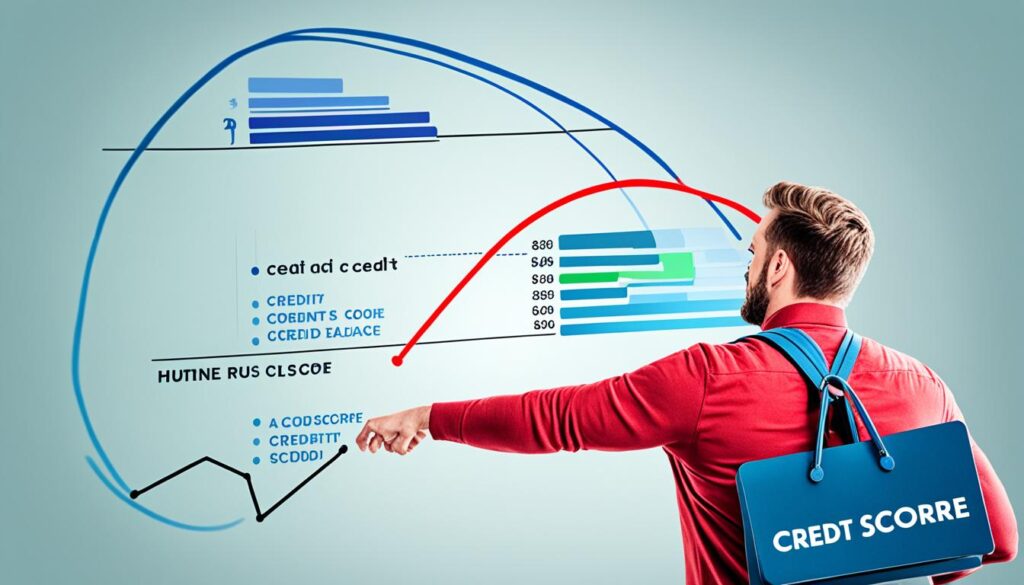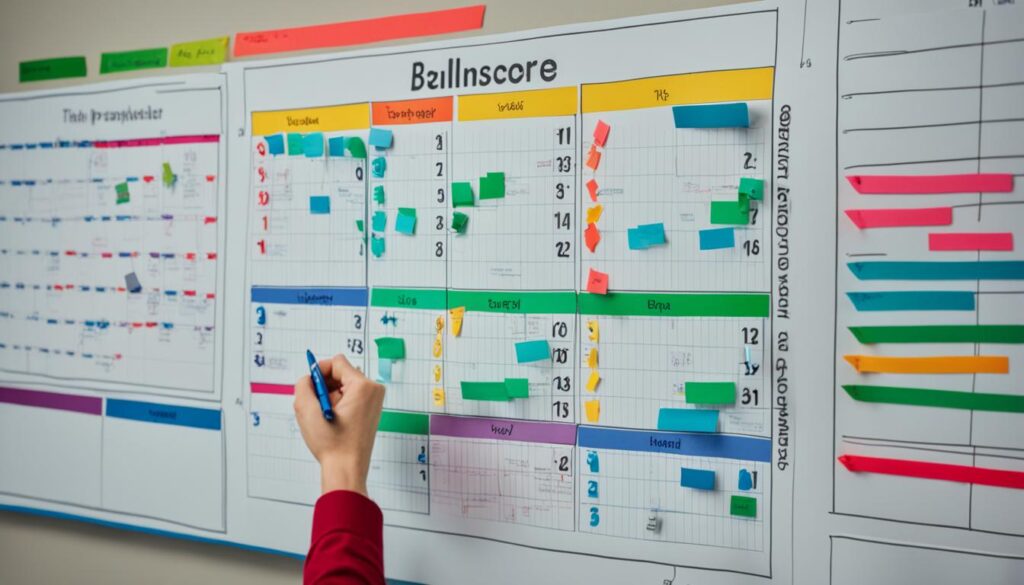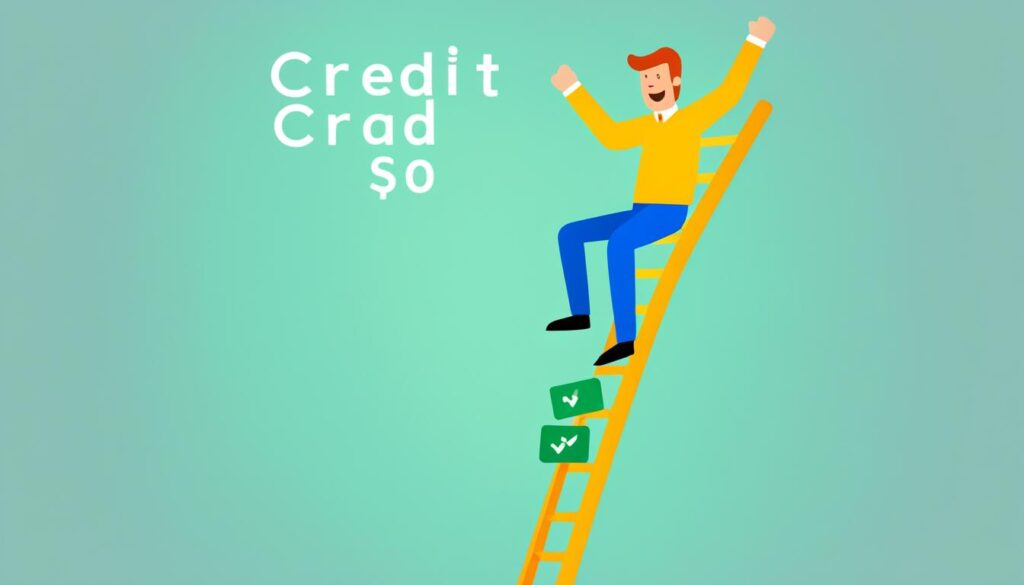Did you know that a single late payment can drop your credit score by up to 100 points?
Having a good credit score is essential for financial stability and flexibility. It affects your ability to get loans, rent an apartment, or even secure a job. If you’re looking to improve your credit score and enhance your overall financial standing, you’re in the right place. In this article, I will share my top strategies for credit score improvement.
Understanding Credit Scores
Before we dive into the tips, let’s take a moment to understand credit scores. Your credit score is a three-digit number that represents your creditworthiness. It is calculated based on your credit history, including factors such as payment history, credit utilization, length of credit history, and credit mix.
Click here to purchase Credit Secrets Bible on Amazon
Key Takeaways:
- A good credit score is crucial for financial stability and flexibility.
- Your credit score is determined by factors such as payment history, credit utilization, length of credit history, and credit mix.
Understanding Credit Scores
Before we dive into the tips for credit score improvement and how to boost your credit score, it’s essential to have a clear understanding of what credit scores are and how they can impact your financial life.
A credit score is a three-digit number that represents your creditworthiness and is calculated based on various factors, including your payment history, credit utilization, length of credit history, and types of credit used. Lenders and creditors use this score to assess your creditworthiness and determine whether to approve your loan or credit application.
A good credit score is typically considered to be around 670 or above, while an excellent credit score is usually 800 or higher. Having a higher credit score not only increases your chances of getting approved for loans and credit cards but also allows you to access better interest rates and terms, saving you money in the long run.
The components that make up your credit score include:
- Payment history: This is the most crucial factor in determining your credit score. It reflects your track record of making payments on time and accounts for approximately 35% of your overall score.
- Credit utilization: This represents the percentage of your available credit that you’re currently using. Keeping your credit utilization below 30% is ideal and can positively impact your score.
- Length of credit history: The length of time you’ve had credit accounts for around 15% of your credit score. Generally, a longer credit history demonstrates stability and responsible credit management.
- Types of credit used: Lenders like to see a mix of different types of credit, such as credit cards, loans, and mortgages. Having a diverse credit mix can account for approximately 10% of your credit score.
- New credit applications: Applying for multiple credit accounts within a short period can raise red flags to lenders, as it may indicate financial instability. Be mindful of how often you apply for new credit, as it can impact around 10% of your credit score.
Understanding these components and their weightage in calculating credit scores is crucial when it comes to improving and boosting your credit score. In the following sections, we’ll delve deeper into specific strategies you can implement to enhance your creditworthiness and achieve a higher credit score.
Review Your Credit Report
The first step in improving your credit score is to thoroughly review your credit report. Your credit report contains important information about your credit history and is used by lenders and creditors to assess your creditworthiness. By reviewing your credit report, you can identify any errors or negative items that may be dragging down your credit score.
Start by obtaining a copy of your credit report from the three major credit bureaus: Experian, Equifax, and TransUnion. You are entitled to one free credit report from each bureau every year, so take advantage of this opportunity to review your credit information.
How to Review Your Credit Report
- Check for Errors: Carefully examine your credit report for any errors such as incorrect personal information, inaccurate account details, or unauthorized accounts. These errors can negatively impact your credit score, so it’s crucial to dispute them and have them corrected.
- Identify Negative Items: Look for any negative items on your credit report, such as late payments, collections, or bankruptcies. These negative items can significantly lower your credit score. Take note of these items as they will need to be addressed as part of your credit score improvement strategy.
- Monitor Credit Utilization: Review your credit utilization ratio, which is the percentage of your available credit that you are currently using. High credit utilization can have a negative impact on your credit score. Aim to keep your credit utilization below 30% to maintain a healthy credit profile.
- Spot Identity Theft: Keep an eye out for any signs of identity theft, such as unfamiliar accounts or inquiries on your credit report. If you suspect fraudulent activity, report it immediately to the credit bureaus and take steps to protect your identity.
By carefully reviewing your credit report, you can gain a clear understanding of your current credit situation and identify areas that require improvement. It’s important to regularly review your credit report to stay informed about your credit status and take proactive steps to improve your credit score.
SAMPLE TABLE
| Section | Description |
|---|---|
| Past Due Payments | Records of late or missed payments |
| Collections | Accounts that have been sent to collections |
| Public Records | Bankruptcies, foreclosures, or tax liens |
| Hard Inquiries | Records of recent credit applications |
| Positive Accounts | Records of accounts in good standing |
Table: Categories in a Credit Report
Pay Bills on Time
One of the most important factors in credit score improvement is paying your bills on time. Consistently meeting your financial obligations demonstrates responsible financial behavior and establishes a positive payment history, which is crucial for improving your credit score.
When you make late payments or miss payments altogether, it can have a significant negative impact on your credit score. Payment history contributes to approximately 35% of your credit score, making it one of the most influential factors in determining your creditworthiness to lenders and creditors.
To avoid late or missed payments, it’s essential to prioritize bill payments and establish effective payment strategies. Here are a few tips to help you stay on track:
- Set up automatic payments: Many lenders and service providers offer the convenience of automatic bill payments. By setting up automatic payments, you can ensure that your bills are paid on time without the risk of forgetfulness. Just be sure to monitor your accounts regularly to prevent any unexpected issues or overdrafts.
- Create payment reminders: If automatic payments aren’t an option or you prefer a more hands-on approach, consider setting up payment reminders. Utilize your phone’s calendar, a dedicated bill tracking app, or even a simple spreadsheet to keep track of your due dates. Set reminders a few days in advance to allow yourself enough time to gather the necessary funds and make your payment.
- Establish a budget: Creating a budget can help you better manage your finances and ensure that you have enough money available to cover your monthly bills. Allocate a specific portion of your income to cover essential expenses, including your rent or mortgage, utilities, credit card payments, and any other recurring bills. This proactive approach will enable you to plan ahead and avoid any surprises or financial strain.
By incorporating these strategies into your financial routine, you can develop responsible payment habits that will positively impact your credit score improvement journey. Remember, consistency and timeliness are key when it comes to paying your bills on time.
Reduce Credit Card Balances
One of the key strategies to improve your credit score is to effectively reduce your credit card balances. High balances can have a negative impact on your credit score, so it’s essential to take steps to lower them and improve your overall credit utilization ratio.
Here are some effective ways to reduce your credit card balances:
Click here to purchase Credit Secrets Bible on Amazon
- Create a Budget: Start by analyzing your monthly income and expenses. Identify areas where you can cut back and allocate more money towards paying down your credit card balances.
- Pay More Than the Minimum: Whenever possible, pay more than the minimum payment due on your credit card. This will help you make progress towards reducing your balance faster.
- Focus on High-Interest Cards: If you have multiple credit cards, prioritize paying off the ones with the highest interest rates first. This will save you money on interest charges in the long run.
- Consider a Balance Transfer: Look into transferring your credit card balances to a card with a lower interest rate. This can help you save money on interest and accelerate your debt repayment.
- Avoid Using Your Credit Cards: While you’re working on reducing your balances, try to minimize new charges on your credit cards. Focus on using cash or a debit card instead.
“Reducing credit card balances is a vital step for credit score improvement. By implementing these strategies, you can effectively lower your balances, improve your credit utilization ratio, and ultimately increase your credit score.” – CreditExpert123
By following these strategies and diligently working towards reducing your credit card balances, you can make significant progress in improving your credit score. Remember, it takes time and discipline, but the long-term benefits are worth it.
Debt Repayment Comparison
| Credit Card | Balance | Interest Rate | Minimum Payment |
|---|---|---|---|
| Card A | $5,000 | 18% | $150 |
| Card B | $3,000 | 15% | $100 |
| Card C | $2,000 | 12% | $75 |
As shown in the table above, tackling higher balance cards with higher interest rates first can save you money on interest charges. By allocating additional funds towards these balances, you can make significant progress in reducing your overall credit card debt.

Keep Old Accounts Open
Closing old accounts may seem like a good idea, but it can actually harm your credit score. As an experienced credit specialist, I advise you to consider the benefits of keeping old accounts open and understand how they contribute to credit score improvement.
When you close an old account, you may inadvertently decrease the length of your credit history, which is an important factor in determining your credit score. Ways to improve credit score often involve maintaining a long credit history, as it demonstrates your ability to responsibly handle credit over time.
By keeping old accounts open, you are showing lenders that you have a proven track record of managing credit. This can have a positive impact on your credit score, as it suggests that you are a reliable borrower. Additionally, raising your credit score is possible by keeping accounts with no negative history open, as it demonstrates a low credit utilization ratio.
Pro Tip: If you have unused credit cards, consider making a small purchase each month and paying it off in full to keep the account active and in good standing.
However, it’s important to note that some old accounts may come with annual fees or high interest rates. In such cases, you might want to evaluate whether the benefits of keeping the account open outweigh the costs. If the account is negatively impacting your finances, it may be necessary to close it. Credit score improvement should always be balanced with your overall financial well-being.
The Power of Longstanding Credit
Older accounts contribute to the length of your credit history, which can work in your favor when it comes to applying for new credit or loans. Lenders may view individuals with long credit histories as less risky borrowers, which can result in more favorable terms and conditions.
“Maintaining longstanding credit accounts shows lenders that you have a history of responsible credit management and increases your chances for favorable credit offers.” – [Credit Expert Name]
Pro Tip: If you have an old account with a high interest rate, consider contacting the credit card issuer to negotiate a lower rate. This way, you can enjoy the benefits of a longstanding account without paying excessive interest fees.
Key Advantages of Keeping Old Accounts Open
| Advantages | Explanation |
|---|---|
| Long credit history | Demonstrates responsible credit management over time |
| Favorable credit utilization ratio | Shows lower credit utilization, boosting your credit score |
| Increased likelihood of favorable credit offers | Long credit history can result in better terms and conditions |
As you can see, there are clear advantages to keeping old accounts open for credit score improvement. However, it is essential to assess each account’s individual circumstances and weigh the benefits against any associated costs or fees.
Remember, building and maintaining a good credit score requires a combination of responsible financial habits and smart credit management. By utilizing these tips and strategies, you can be well on your way to improving your credit score and achieving your financial goals.
Diversify Your Credit Mix
When it comes to credit score improvement and finding ways to improve your credit score, one important factor to consider is diversifying your credit mix. Having a diverse credit profile can have a positive impact on your credit score.
What is a credit mix?
Your credit mix refers to the different types of credit accounts that you have, such as credit cards, loans, mortgages, or lines of credit. Having a variety of credit accounts demonstrates to lenders that you can manage different types of debt responsibly. This can contribute to an overall improvement in your credit score.
Why does it matter?
Click here to purchase Credit Secrets Bible on Amazon
Diversifying your credit mix shows lenders that you are capable of handling different financial obligations responsibly. It indicates that you have experience managing different types of credit, which can build trust and credibility with lenders. This can ultimately lead to a higher credit score and better borrowing opportunities in the future.
An optimal credit mix typically includes a combination of revolving credit, such as credit cards, and installment credit, such as loans or mortgages. It’s important to note that the ideal credit mix may vary depending on your individual financial situation and goals.
Strategies for diversifying your credit mix:
- Consider adding different types of credit accounts to your financial portfolio, such as a mortgage or an auto loan, if it aligns with your financial goals and responsibilities.
- Explore secured credit cards as a way to establish a solid credit history if you have limited credit or no credit history.
- Use credit responsibly and make timely payments on all your credit accounts to demonstrate your ability to manage different types of credit.
- Avoid opening multiple credit accounts at once, as this can indicate an increased risk to lenders.
- Regularly review your credit mix and make adjustments as needed to align with your financial goals.
By diversifying your credit mix, you can demonstrate your ability to manage different types of credit responsibly, which can contribute to credit score improvement. Remember to use credit wisely, make timely payments, and regularly review and adjust your credit mix as necessary to maintain a healthy financial profile.
Limit New Credit Applications
When it comes to credit score improvement and finding ways to improve your credit score, it’s important to consider the impact of new credit applications. Applying for credit frequently can actually lower your credit score, so it’s crucial to strategically limit these applications to achieve optimal credit score improvement.
One of the reasons why new credit applications can harm your credit score is because they trigger hard inquiries on your credit report. These inquiries indicate that you are actively seeking new credit, which can be a red flag to lenders. Multiple hard inquiries within a short period of time can suggest financial instability and increase the perceived risk associated with lending to you.
To avoid negative impacts on your credit score, it’s essential to be selective and deliberate when applying for new credit. Here are some tips to help you strategically limit new credit applications:
- Research and Compare: Before applying for any new credit, take the time to research and compare different offers. Look for options that align with your financial goals and have favorable terms and conditions. By being well-informed, you can make more confident decisions and reduce the need for multiple applications.
- Focus on Necessities: Apply for credit only when you truly need it. Consider your current financial situation and whether taking on additional credit is a necessity. Applying for credit just to have it or for minor purchases can potentially harm your credit score without providing significant benefits.
- Pre-qualification and Pre-approval: Take advantage of pre-qualification and pre-approval processes offered by lenders. These processes allow you to check if you’re likely to be approved for credit without initiating a hard inquiry. By using these tools, you can assess your creditworthiness and choose the best options to pursue further.
- Time Applications Strategically: If you’re planning to make multiple credit applications, spread them out over time. Submitting several applications within a short period can raise concerns for lenders. By spacing out your applications, you can minimize the negative impact on your credit score.
Remember, credit score improvement requires careful consideration of your credit behavior and decision-making. By limiting new credit applications and being intentional about when and why you apply for credit, you can protect your credit score and work towards achieving your financial goals.
Set Up Payment Reminders
One of the most crucial aspects of credit score improvement is ensuring that you never miss a payment. Late payments can have a significant negative impact on your credit score, undoing all the hard work you’ve put into improving it. To avoid this, it’s essential to set up payment reminders that will help you stay on top of your bills and maintain a positive payment history.
Click here to purchase Dailey Planner on Amazon
There are various ways you can set up payment reminders:
- Calendar Alerts: Utilize the calendar app on your phone or computer to set reminders for due dates. This simple and effective method can help you remember to pay your bills on time.
- Automatic Payments: Consider setting up automatic payments with your creditors. This way, your bills will be paid automatically on their due dates, eliminating the risk of forgetting or missing a payment.
- Mobile Apps: Many banking and personal finance apps offer features that allow you to set up payment reminders. These apps can send you notifications and alerts before your bills are due, ensuring that you never miss a payment.
By utilizing payment reminders, you can stay organized, ensure timely payments, and maintain a positive payment history. This responsible financial behavior will contribute to credit score improvement over time.
Remember, credit score improvement requires consistent effort and responsible financial habits. Setting up payment reminders is just one of the many steps you can take to enhance your creditworthiness and achieve a better credit score.

Keep in mind:
Take advantage of technology to support your financial well-being. Using payment reminder tools can help you stay disciplined and never miss a payment.
Work with Creditors
If you find yourself struggling with debts, it’s crucial to communicate and work with your creditors to improve your credit score. By taking proactive steps, you can negotiate payment plans and resolve outstanding debts effectively.
Here are some strategies you can explore:
- Open Communication: Reach out to your creditors and explain your financial situation. Honesty and transparency are key in establishing a working relationship.
- Negotiate Payment Plans: Work with your creditors to develop manageable payment plans that fit your financial capabilities. Demonstrating your commitment to repaying your debts can positively impact your credit score.
- Seek Professional Help: Consider engaging credit counseling or debt management services. These professionals can provide expert advice, negotiate with creditors on your behalf, and help you develop a comprehensive plan for credit score repair and enhancement.
“Working with my creditors was a game-changer for me. By being proactive and honest, I was able to negotiate payment plans that were feasible for me and repair my credit score in the long run.” – Jane Anderson
Remember, the key to successful credit score improvement lies in open communication and a commitment to resolving outstanding debts. Don’t hesitate to seek help from professionals if you need guidance and support along the way.
Patience and Persistence
Improving your credit score is a journey that requires both patience and persistence. It’s important to understand that credit score improvement doesn’t happen overnight. It takes time and consistent effort to see significant changes in your creditworthiness.
Boosting your credit score involves implementing and maintaining positive financial habits over an extended period. You need to make a commitment to responsible financial behavior and stick to it. While it may seem daunting at times, the long-term benefits of a strong credit score are well worth the effort.
When it comes to credit score improvement, patience is key. Don’t get discouraged if you don’t see immediate results. It’s a gradual process, and progress may not always be linear. Instead, focus on the small victories along the way and celebrate each milestone achieved.
Persistence is equally important. Consistently practicing good financial habits, such as making payments on time, keeping credit card balances low, and avoiding unnecessary credit applications, will have a positive impact on your credit score over time.
Remember, credit score improvement is a marathon, not a sprint. It requires dedication and a willingness to make sustainable changes to your financial behavior. Stay committed, stay persistent, and the rewards will follow.
The Journey to a Better Credit Score
Improving your credit score can be likened to embarking on a journey. Along the way, you’ll encounter obstacles and challenges that may test your patience and determination. But with the right mindset and strategies, you can navigate through these challenges and reach your destination—a higher credit score and improved financial well-being.
“Success is not final, failure is not fatal: It is the courage to continue that counts.” – Winston Churchill
Just like any journey, there may be setbacks or unexpected detours. You might experience financial hardships or encounter unforeseen expenses. But don’t let these obstacles deter you from your goal.
During challenging times, it’s important to stay focused and adapt your approach as needed. Seek guidance from reputable financial advisors, credit counseling services, or credit repair professionals who can provide expert advice and support.
Remember that improving your credit score is not a one-time task; it’s an ongoing process. Continuously monitor your credit report, track your progress, and make adjustments to your financial habits as necessary.
Visualize your credit score as a destination you’re working towards. Keep this image in mind as you navigate the ups and downs of the credit score improvement journey. With patience and persistence, you’ll eventually arrive at your desired destination—a better credit score and the financial opportunities it brings.
Stay motivated, stay focused, and embrace the journey ahead. Your improved credit score awaits!
Click here to purchase Credit Secrets Bible on Amazon
Conclusion
By implementing these credit score improvement tips and strategies, you can increase your credit score and achieve a more favorable financial standing. Take control of your credit today and start seeing positive changes in your credit score over time.
Remember, improving your credit score is a gradual process that requires patience and persistence. It’s essential to review your credit report regularly, pay bills on time, reduce credit card balances, and keep old accounts open. Diversifying your credit mix and limiting new credit applications can also contribute to credit score improvement.
Additionally, setting up payment reminders and working with your creditors to resolve outstanding debts are crucial steps in the journey towards a better credit score. By consistently following these strategies, you can enhance your creditworthiness and open doors to better financial opportunities.
Don’t wait any longer to take action. Start implementing these tips today and watch as your credit score improves, paving the way for a brighter financial future.
FAQ
How can I improve my credit score?
There are several strategies you can implement to improve your credit score. These include reviewing your credit report for errors, paying bills on time, reducing credit card balances, keeping old accounts open, diversifying your credit mix, limiting new credit applications, setting up payment reminders, working with creditors, and practicing patience and persistence.
What is a good credit score?
A good credit score typically falls within the range of 670 to 739. However, the specific range may vary depending on the credit scoring model used by lenders. It’s important to regularly monitor your credit score and strive for improvement regardless of the current range.
How long does it take to improve a credit score?
The time it takes to improve a credit score varies depending on individual circumstances. Generally, it can take several months to a year or more to see significant improvements in your credit score. Consistently following good credit habits and addressing negative factors can expedite the process.
Will closing old accounts improve my credit score?
Closing old accounts can actually harm your credit score. It reduces the overall length of your credit history, which is an important factor in credit scoring. It’s generally advisable to keep old accounts open, especially if they have a positive payment history and contribute to a diverse credit mix.
How often should I review my credit report?
It’s recommended to review your credit report at least once a year from each of the three major credit bureaus (Equifax, Experian, and TransUnion). Regularly monitoring your credit report allows you to identify and dispute any errors, as well as address any negative items that may be impacting your credit score.
Can I improve my credit score if I have negative items on my credit report?
Yes, it is possible to improve your credit score even if you have negative items on your credit report. By addressing these negative items, such as paying off delinquent accounts or negotiating settlements, you can gradually improve your credit score over time.
How long do negative items stay on my credit report?
Most negative items, such as late payments or collections, can stay on your credit report for up to seven years. However, more severe negative items like bankruptcies can remain on your credit report for up to ten years. It’s important to address these negative items and focus on positive credit behaviors to mitigate their impact on your credit score.
Will checking my credit score frequently hurt my credit?
No, checking your own credit score, also known as a soft inquiry, does not hurt your credit. However, if a lender or creditor performs a hard inquiry as part of a credit application, it may have a small and temporary impact on your credit score.
Can credit repair companies improve my credit score?
Credit repair companies claim to help improve your credit score by disputing inaccurate or unverifiable information on your credit report. While they may be able to assist with this process, it’s important to be cautious and do thorough research before engaging their services. Many of the steps involved in credit repair can be done independently for free or at a lower cost.
Should I close credit card accounts with zero balances?
It’s generally not necessary to close credit card accounts with zero balances, as long as they are not charging annual fees or any other costs that are out weighing the benefits. Keeping these accounts open can help maintain a longer credit history and improve your credit utilization ratio, which is an important factor in credit scoring.
Click here to purchase Credit Secrets Bible on Amazon



You have mentioned very interesting details! ps decent internet site.Money from blog